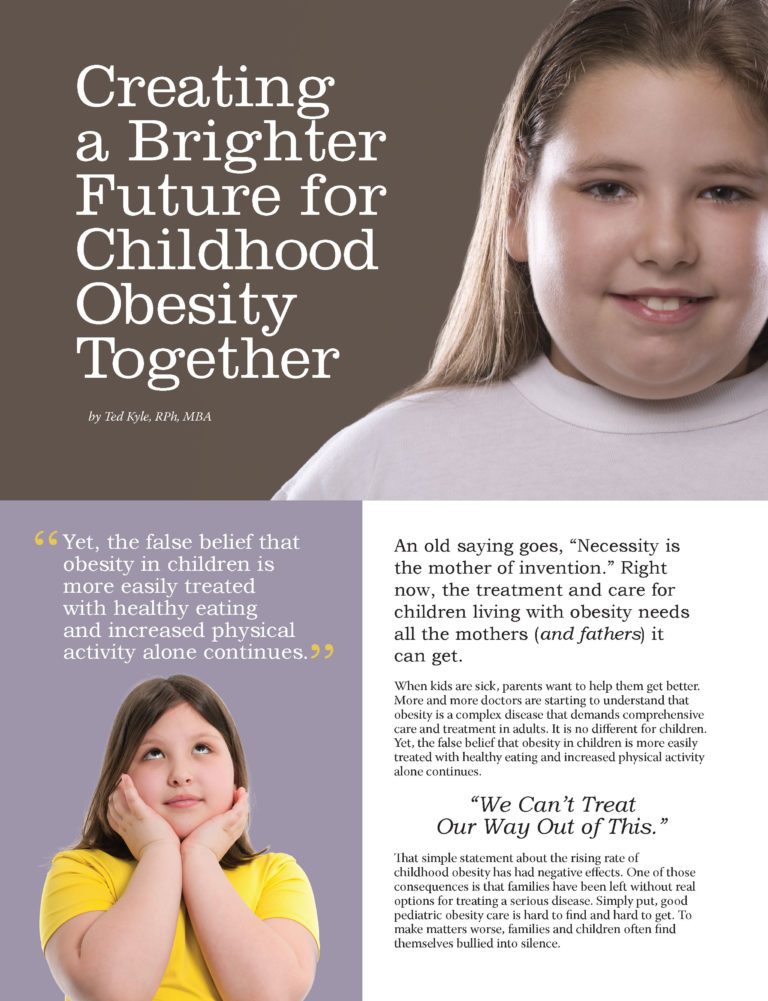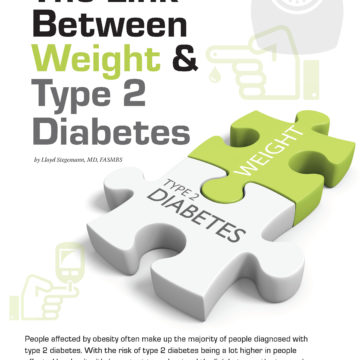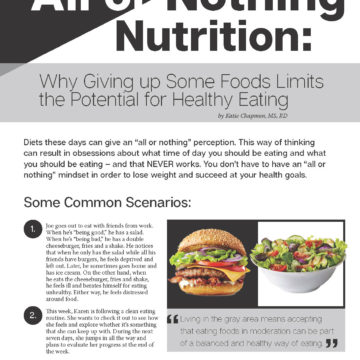Creating a Brighter Future for Childhood Obesity Together


by Ted Kyle, RPh, MBA
An old saying goes, “Necessity is the mother of invention.” Right now, the treatment and care for children living with obesity needs all the mothers (and fathers) it can get.
When kids are sick, parents want to help them get better. More and more doctors are starting to understand that obesity is a complex disease that demands comprehensive care and treatment in adults. It is no different for children. Yet, the false belief that obesity in children is more easily treated with healthy eating and increased physical activity alone continues.
“We Can’t Treat Our Way Out of This.”
That simple statement about the rising rate of childhood obesity has had negative effects. One of those consequences is that families have been left without real options for treating a serious disease. Simply put, good pediatric obesity care is hard to find and hard to get. To make matters worse, families and children often find themselves bullied into silence.
Thankfully, this year brings the hope of much needed change for families and children living with obesity. To help make that change a reality, advocates (like the mothers and fathers of invention) need to step forward.
Parents are in a Bind
For some time now, parents of young children with severe obesity have faced an almost impossible problem. Their child is seen as someone who has eaten too much and moved too little. However, when a child has had this condition from an early age, it is not due to their lifestyle. It is due to their DNA, pure and simple. But these parents face a huge burden of blame and guilt for no good reason.
Obesity is Not a Blame Game
Duke University pediatrics professor Sarah Armstrong has a 15-year-old patient she has seen for seven years. She told the New York Times, “The parents both have worked with us tirelessly, the family drives an hour to see us, they’ve tried various diets and exercise, and he continues to gain weight.”
In addition, Dr. Armstrong faces a battle to get him the treatment he needs through Medicaid. “If he had cancer and needed chemotherapy, no one would tolerate this,” said Armstrong. “People view obesity as the parent’s fault, or the child’s fault,” she continued. It leaves parents and doctors with, “really sick children, and there’s a safe and effective treatment right down the street, and I can’t get them there,” Armstrong concluded.
Meanwhile, this child has withdrawn from school because he was the target for so much bullying.
One Size Does Not Fit All
Obesity is far from simple and straightforward. Even in children, it has many potential causes—and the best treatment for one child might be the very worst for another. Many adults carry emotional scars from pressure about their body weight in childhood. These scars can show up as disordered eating or body image problems that continue into adulthood.
However, specialized obesity care for youth and children aims to avoid such problems, and science tells us that care from a healthcare provider (HCP) brings better outcomes.
Better Options Coming
Not only can treatment from a HCP bring better outcomes, but better options are also on the way. This will give obesity care professionals more and better tools for helping families that face real problems. The American Academy of Pediatrics recently determined that bariatric surgery can be a good option for some teens with obesity.
In addition, new drugs to treat childhood obesity are in various stages of development.
They include:
- Saxenda® (liraglutide): This drug is already approved for treating obesity in adults. At a lower dose, it is also approved for treating type 2 diabetes in children ten and older. Study results for its safety and effectiveness for weight-loss in teens will be available in early 2020.
- Setmelanotide: This is a highly targeted drug for rare genetic forms of childhood obesity. It will soon be submitted to the FDA for approval. To date, it has shown impressive results and looks promising for children who live with this type of obesity.
Of course, anything can happen before these treatments become available. But, it is important to note that the future is looking brighter for the treatment of childhood obesity.
The Need for Advocates and Options
Families, children and teens need better options. Most of all they need good advocates. And the best advocates are the people living with this issue.
Two amazing young women who are leading this cause are also members of the OAC Community: Faith Newsome and Emily Robinson. They are college students in North Carolina who are rising to the challenge. They lead an on-campus organization, OCEANS, which aims to empower young people with obesity through self-advocacy, their community and their society.
Our Hope for the Future
We hope that Faith and Emily, along with others, will be successful in their efforts in advocating for help with childhood obesity. We need their voices, demanding respect for the diverse needs of children with obesity. The OAC plans to do everything we can to support them and help build a vibrant community of youth and families advocating for better obesity care.
To read the mentioned New York Times article: NYTimes.com/2019/11/11/well/family/bariatric-surgery-teen-obesity.html
To learn more about OCEANS, visit: OceansLifestyles.com
About the Author:
Ted Kyle, RPh, MBA, founded ConscienHealth in 2009. He is a pharmacist and healthcare innovation professional who works with health and obesity experts for sound policy and innovation to address obesity. Mr. Kyle serves on the Board of Directors for the Obesity Action Coalition (OAC), advises The Obesity Society on advocacy issues and consults with organizations addressing the needs of people living with obesity. His widely-read daily commentary, published at ConscienHealth.org, reaches an audience of more than 10,000 thought leaders in health and obesity.
by Michelle Vicari Summer 2021 Many of us have been eating home cooking for months and we’re…
Read Article






